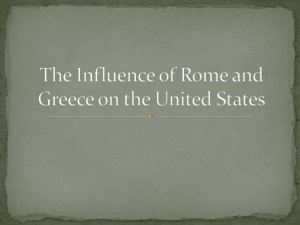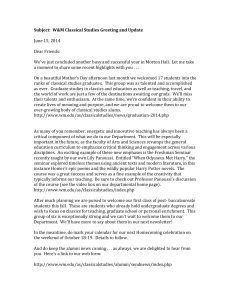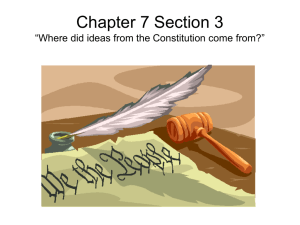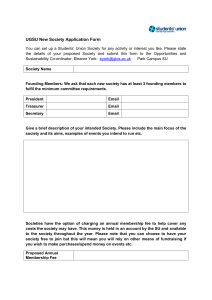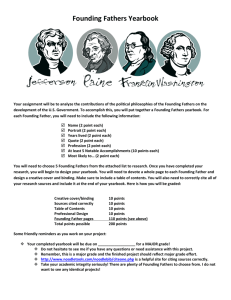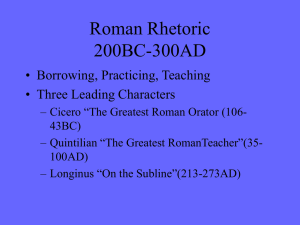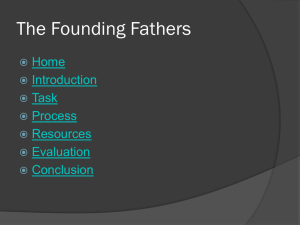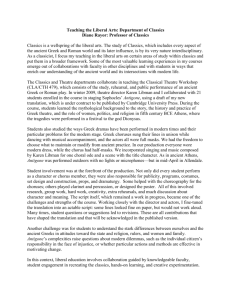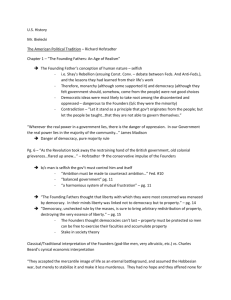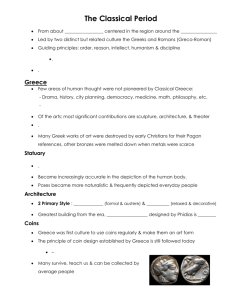Ancient Civilizations Contributions
advertisement
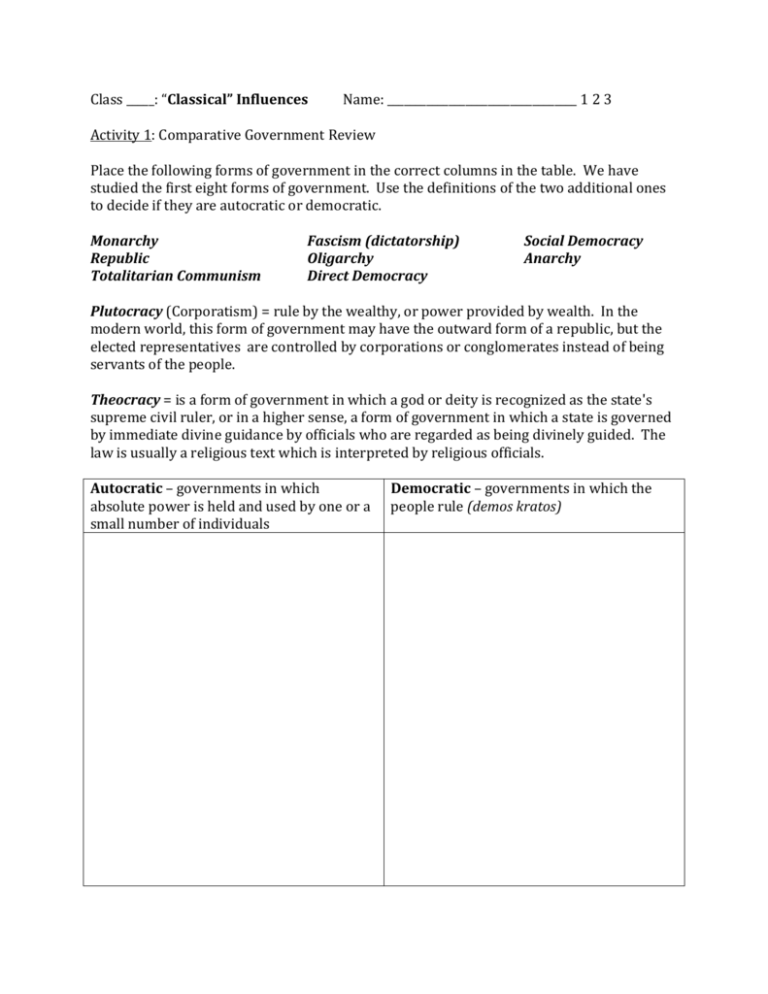
Class _____: “Classical” Influences Name: __________________________________ 1 2 3 Activity 1: Comparative Government Review Place the following forms of government in the correct columns in the table. We have studied the first eight forms of government. Use the definitions of the two additional ones to decide if they are autocratic or democratic. Monarchy Republic Totalitarian Communism Fascism (dictatorship) Oligarchy Direct Democracy Social Democracy Anarchy Plutocracy (Corporatism) = rule by the wealthy, or power provided by wealth. In the modern world, this form of government may have the outward form of a republic, but the elected representatives are controlled by corporations or conglomerates instead of being servants of the people. Theocracy = is a form of government in which a god or deity is recognized as the state's supreme civil ruler, or in a higher sense, a form of government in which a state is governed by immediate divine guidance by officials who are regarded as being divinely guided. The law is usually a religious text which is interpreted by religious officials. Autocratic – governments in which absolute power is held and used by one or a small number of individuals Democratic – governments in which the people rule (demos kratos) Activity 2: How were the Founding Fathers influenced by “The Classics?” The Founding Fathers & the Classics. by Dr. Joe Wolverton II What are The Classics? “The Classics” includes all the literary (written) works including all the philosophical, artistic, governmental, and historical writings from Ancient Greece and Rome. From the Declaration of Independence to the Constitution, the Founding Fathers looked to classical history as a reliable guide to their successful experiment in building a lasting republic. I have but one lamp by which my feet are guided, and that is the lamp of experience. I know of no way of judging of the future but by the past. Patrick Henry. March 23, 1775. Patrick Henry’s view of the value of history was not unique. The men who created our constitutional republic agreed with French author Charles Pinot Duclos, who observed: We see on the theater of the world a certain number of scenes which succeed each other in endless repetition: where we see the same faults followed regularly by the same misfortunes, we may reasonably think that if we could have known the first we might have avoided the others. The past should enlighten us on the future: knowledge of history is no more than an anticipated experience. All our Founding Fathers believed that history was the foundation for the future – that the past was intimately connected to the future – and that a complete understanding of history was very important. By studying history — particularly that of the Greek and Roman republics of antiquity — the Founding Fathers believed that they could find the key to protecting America against the mistakes and threats that had destroyed past societies. 1. What are The Classics? _________________________________________________________________________ _____________________________________________________________________________________________ 2. Why did the Founding Fathers value studying classical history? _________________________________________ _____________________________________________________________________________________________ Early Education The Founding Fathers learned very early in life to value the stories and all literary works of ancient Greece and Rome. They learned these stories, not from secondary sources, but from studying the classics themselves as primary sources. From these stories they drew knowledge and inspiration that helped them create a republic far greater than anything created in antiquity. Classical training usually began at age eight, whether in a school or at home under the guidance of a private tutor. Students were taught Greek and Latin (the language used in Ancient Rome), so they could directly study classical works by authors like Virgil, Horace, Justinian, Tacitus, Herodotus, Plutarch, Lucretius and Thucydides. Further along in their education, students were required to translate Cicero’s Orations and Virgil’s Aeneid. They were expected to translate Greek and Latin passages aloud, write out the translations in English, and then re-translate the passages back into the original language using a different tense. Whether at home or in a schoolhouse, the goal of education in the early days of our nation was to instill virtue in the students. The Founders were taught that free societies were sustained by a virtuous populace, and that, if a society were to abandon a study of the classics, that same society would eventually abandon the virtues championed by the classical authors of Ancient Greece and Rome. Colonial colleges required entering freshmen to be able to read, translate, explain and discuss the Greco-Roman classical works. In 1750, Harvard demanded that applicants be able to extemporaneously “read, construe, and parse Cicero, Virgil, or such like classical authors and to write Latin in prose, and to be skilled in making Latin verse, or at least to know the rules of Prosodia, and to read, construe, and parse ordinary Greek as in the New testament, Isocrates, or such like and decline the paradigms of Greek nouns and verbs.” Of note is the fact that John Trumball, the illustrious artist, passed Harvard’s exacting entrance exam at only 12 years of age. This is John Trumball’s painting “Declaration of Independence.” College lessons were as demanding as the entrance exams. American colonial curricula were based on the Latin “trivium” of rhetoric, logic, and grammar, as well as the “quadrivium” of arithmetic, music, geometry, and astronomy. The colleges attended by our Founding Fathers offered very few elective courses and coursework focused chiefly on the study of classical works. And those works were studied in the languages in which they were originally written! Students were taught lessons in virtue and liberty from the works of Herodotus, Xenophon, Plutarch, Livy, Sallust, Tacitus and Polybius. Thomas Jefferson’s classmates recalled that he studied at least 15 hours a day and carried his Greek grammar book with him wherever he went. Twenty-nine of the fifty-six signers of the Declaration of Independence were college educated. In addition, 30 out of the 55 delegates who attended the Constitutional Convention in Philadelphia in 1787 (the series of meetings in which our Constitution was written) were college graduates. This means that the majority of the Founding Fathers were highly educated and influenced by the classics, and since they were the main focus of all education at the time, even those who did not graduate from college would have received education in the classics during their primary and secondary educational experiences. Because of the formidable classical curricula at colonial colleges, the classics became a well from which the Founders drank deeply. In the classics, the Founding Fathers found their heroes and villains, and they also detected warning signs along the road of statecraft on which they would tread. 3. How was Colonial American education different from education, today? ______________________________ _________________________________________________________________________________________ _________________________________________________________________________________________ _________________________________________________________________________________________ 4. Why did the history, philosophy and governments of Ancient Greece and Rome have an influence on our form of government? ____________________________________________________________________________ _________________________________________________________________________________________ _________________________________________________________________________________________ _________________________________________________________________________________________ Classical Heroes and Villains Ancient history provided the Founders with examples of behavior and circumstances that they could apply to their own circumstances. Their heroes were Roman and Greek republicans and defenders of liberty. All of the Founders’ Roman heroes lived at a time when the Roman republic was being threatened by power-hungry, bloodthirsty dictators and shadowy conspirators. The Founders’ principal Greco-Roman heroes were Roman statesmen: Cato the Younger, Brutus, Cassius and Cicero — all of whom sacrificed their lives in unsuccessful attempts to save the Roman Republic — as well as the celebrated Greek lawgivers Lycurgus and Solon. Cato the Younger was a Roman of sterling reputation who lived from approximately 95 B.C. to 46 B.C. He is described as being “unmoved by passion and firm in everything,” even from his youth. He was renowned for finishing whatever he started and for hating flattery. He embraced every Roman virtue, and he was especially appreciated for his sense of justice and his even temperament. As a senator, Cato was always in attendance when the Senate was in session. A no-nonsense legislator, Cato was hated by Pompey and Caesar for his integrity and for his refusal to aid them in their corrupt plans to grab more power. Although they imprisoned him, the public clamored for his release and Caesar reluctantly complied. Unable to squelch Cato’s attacks on their corrupt policies, Caesar and Pompey sent him to Cyprus. Finally, Cato aligned himself with Brutus against Caesar, a decision that would eventually cost him his life. George Washington admired Cato so greatly that he had Joseph Addison’s play about Cato performed in Valley Forge to boost the troops’ morale. The most popular Roman hero of the Founding Fathers was Cicero, the silver-tongued Roman orator. Cicero lived from approximately 106 B.C. to 43 B.C. John Adams, in his Defense of the Constitution, said of Cicero: “All of the ages of the world have not produced a greater statesman and philosopher united than Cicero…” First as a lawyer, then as a consul and senator, Cicero boldly defended the republic against the rise of dictators. Cicero delivered his greatest speeches in defense of the republic against the Catilinarian Conspiracy. The Catilinarian Conspiracy was a plot to overthrow the republic, hatched by aristocrat Lucius Sergius Catiline with the help of a cabal of aristocrats and disaffected veterans. In 63 B.C., Cicero exposed and thwarted the plot, and Catiline was forced to flee from Rome. For his service in saving Rome, Cicero was given the title “Father of his Country” [Pater Patriae] by his countrymen. Like Brutus and Cassius, Cicero’s courageous defense of republican liberty in the face of designing conspirators made him a logical model for emulation by our Founding Fathers. Regarding the Greek classics, the American Founding Fathers greatly admired Lycurgus, the lawgiver of Sparta. Lycurgus lived in the 9th century B.C. and reformed the entire Spartan commonwealth. His most important reform was the establishment of a senate equal in authority with the monarchy in matters of great importance. Prior to Lycurgus’ innovation, the Spartan government swayed between monarchy and democracy, depending on whether the king or the people had the upper hand. The senate served as a check on the excesses of both king and subjects. The biographer Plutarch called Lycurgus’ institutions “one of the greatest blessings which heaven can send down.” Another Greek famed for his reform of the law was Solon. Born in Athens about 638 B.C., Solon achieved glory as one of the “Seven Sages of Greece.” Around 590 B.C., he was given the task of reforming the Athenian constitution. Solon’s improvements included the right of trial by jury and the division of society into several bodies that would balance and check each other in governing Athens. After finishing his constitutional reforms, Solon left Athens for 10 years. While he was away, Pisistratus, his former friend, took control of the government and created tyrannical controls on Athens. Both Lycurgus and Solon appreciated the need for incorporating checks and balances into government, a need that the American Founders understood from this example and used as they designed the checks and balances into our Constitution. One of the best ways of demonstrating our respect for our Founding Fathers, and our dedication to the principles of liberty they bequeathed to us, is to study the books they studied. By so doing, we will come to appreciate, as they did, that republics are as fragile as they are glorious. We will also more fully recognize that unassailable personal virtue and vigilant loyalty to constitutional principals are the only hope for perpetuation of the freedom that our forebears bought with their blood. May we learn from the successes and failures of the ancients and not allow the “lamp of experience” to be extinguished in our lives. Activity 3: Ancient Greece Video Notes 1. The end of c________________ and apartheid brought on a new trend of d___________________. 2. The word democracy means rule by the p______________________. 3. Democratic ideals include individual equality and f____________________. 4. The roots of democratic ideals go back to Ancient Greece - ____________ B.C. 5. The Greek city-sate of A______________ was the center of Greek civilization and culture. 6. Democracy in Athens called for a________________ citizenship. 7. Citizens served in the public assembly which passed l_________________ and established governmental policies. Policies = _________________________________________________________________________________ Public = __________________________________________________________________________________ 8. Citizens had the right to: V______________________ Hold public office. Own p___________________ 9. What does the following quote mean?
